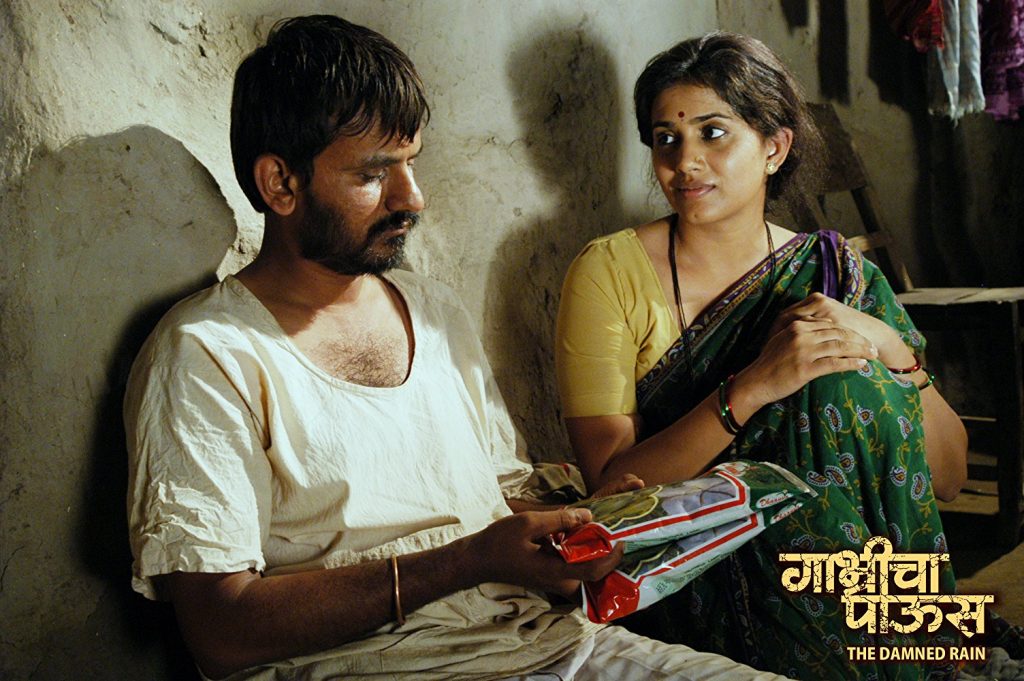Gabhricha Paus, more than ably directed by Satish Manwar, proves that you don’t need stars or formulaic subjects to make a good film. What you need is the conviction and honesty to tell a good human story nicely.
Kisna (Girish Kulkarni), like many others in India, is a farmer toiling to make a living. With all the difficulties facing them and Maharashtra having a high rate of farmer suicides, Kisna’s wife (Sonali Kulkarni) is convinced that he too is contemplating ending his life and thus ropes in their 6 year old son against his wish to be with Kisna all the time and report any irregularities in his behavior. Kisna, meanwhile, is doing only what he knows best – toiling hard, praying that the rains will be on his side at least this year, hoping he gets a good crop, wishing he is able to sell his produce and preparing for the next season…
Though the film takes a serious and contemporary issue of the farmers’ suicide in Maharasthra, the film refuses to be burdened by heaviness or self pity. In fact, it takes the road not taken – the humorous one and that is its biggest strength. A well-worked out screenplay is aided with several moments of light, black humor that bring a smile to your face as the film explores the struggle poverty-stricken farmers have with nature, debt, bureaucracy and a total lack of basic amenities. At the same time, the film tellingly captures simple human moments in the daily lives of its protagonists. And though the film was shot at an extremely difficult time during the monsoons, one has to commend it for being able to integrate the weather conditions pretty well into its storyline.
That said, there are the odd glitches that do get to you. The scenes of the fellow farmer, who tells Kisna he is wasting his time, get into preachy territory and go against the grain of the rest of the film. Maybe, an alternate method of treating them was needed – something that was integrated cinematically better into the story rather than these long dialogue set pieces. Also, the final outcome is predictable and somewhere, you do start to feel the length of the film, particularly, in the last 20 minutes or so.
The performances, by and large, are spot on barring Sonali Kulkarni who seems to be ‘acting’ rather than being the character. Girish Kulkarni is fine as Kisna toiling and going about his day to day life unaware of all the drama that is unfolding behind his back. Jyoti Subhash as Kisna’s mother is the scene-stealer of the film. She gets the pitch and tone of the film spot on and never strikes a false note easily taking away each and every scene she appears in. Aman Attar is OK enough as the son. Though his performance is awkward in places, in particular, his crying scenes at least his character is not sketched like the usual precocious filmi brats we are used to seeing in our films. Special mention must be made of Veena Jamkar playing the wife of a farmer who has committed suicide. She is an intense actress with tremendous screen presence and to her credit, she responds with a strong performance.
Technically, one has to commend Sudheer Palsane’s evocative cinematography. Palsane is in fine form – be it capturing the rural landscape of Maharashtra or the interior of the farmers’ houses. Special mention must be made of the night exterior lighting as well. The editing (Suchitra Sathe) maintains the pace and rhythm of the film nicely though, as mentioned earlier, the length does tell towards the end. The background score (Mangesh Dhadke) is adequate enough.
All in all, Gabhricha Paus is well, well worth a watch.
Marathi, Comedy, Drama, Color


